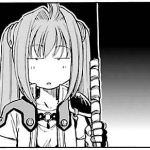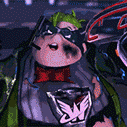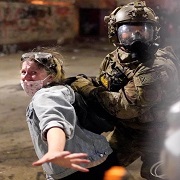|
Polaron posted:I think if they had done more to sell the Catalyst as a fundamentally broken AI people might have accepted it more. Because you're right, making peace with the geth and the quarians proves that organics and synthetics can live together in peace. I agree that Shepard should be able to make a point about making friends with the geth, or even about EDI only opposing very specific organics for very specific reasons, but only so that the Catalyst can point out Shepard's short-sightedness and lack of experience in this matter.
|
|
|
|

|
| # ? May 19, 2024 19:14 |
|
But you're arguing on the assumption that the ending is attempting to tie everything in the game together when the ending only takes a piece of the overall themes in Mass Effect and makes it the focus. The Organic/Synthetic is just one aspect of the Creator/Created conflict. Had the Catalyst been an effective messenger/impediment along these lines, I'd argue that the Crucible then would be in a much better place. As it stands, you end up with a disconnected ending that addresses very little of what the overall themes of Mass Effect were attempting to portray.
|
|
|
|
Thwomp posted:But you're arguing on the assumption that the ending is attempting to tie everything in the game together
|
|
|
|
But then you say the Catalyst can just quip that Shepard is being too shortsighted. And actually, I think it does in a way. I actually can't tell if you're arguing what I'm arguing (the Catalyst is a fundamentally broken concept as-is and needed to be connected to the greater Creator/Created theme).
|
|
|
|
It's not just the organics/synthetics conflict though. The genophage plot is pretty much about the same thing, with the harsh solution to the problem of predestined conflict. Also killing the rachni queen in the first game, and other smaller moments. But in all those cases the player can reject the entire premise, so why not during the ending that's entirely about that theme? But of course the writers probably never even thought about thematic things like this too hard, it's all just a Star Trek homage or something.
|
|
|
|
BioMe posted:But of course the writers probably never even thought about thematic things like this too hard, it's all just a Star Trek homage or something. If it were, you'd definitely be able to talk it into shutting itself down somehow 
|
|
|
|
Polaron posted:If it were, you'd definitely be able to talk it into shutting itself down somehow Or if this were an Obsidian game. Now I think about it, the entire ending scenario - taken solely as a setpiece - reads exactly like Obsidian. You've got this big, beautifully detailed area full of thematically appropriate decorations and grand backdrops, and there's basically nothing in it except for one [entity] with which you will have a conversation and then leave. Of course, if this were actually an Obsidian gig the conversation would be like fifty times the size and you could have an actual argument and do cool things like turn the guy's argument against itself or convince him of this thing or that thing or find some aspect of his personality to exploit or something. But no, this is New BioWare's Lead Writers operating completely unsupervised, and so we got what we got - which was "what can you tell me about [this colour ending]?" followed by "I should go".
|
|
|
|
If you can just talk the Catalyst out of it, then that would just be the objectively best solution for most people, and that wouldn't be interesting.
|
|
|
|
Sombrerotron posted:Let's keep in mind here that there's probably been quite a few playthroughs of ME3 where the quarians and geth didn't make peace, and where the geth actually annihilated the last of the quarians. Secondly, what does making peace really prove? You've managed to end a war at the very last moment, but that hardly means it'll last. Furthermore, it seems like a fair bet that someone'll create another AI that'll spawn a conflict with organics. We've seen two malevolent AI in ME1 (one of which [spoiler]is eventually made into EDI, who also rebels against her creators) already, and then there was the Overlord project in ME2. Given the knowledge of previous cycles the Catalyst presumably has, too, can you really blame it for assuming that there'll be a catastrophic organic-synthetic war at some point in the future? I mean, the Catalyst pretty much does dismiss any evidence to the contrary, insisting that this conflict is inevitable. A game can make all the ending statements it wants, and it can handwave away whatever events it wants, if those statements are incongruous to a player's experience then there's been a failure somewhere. You don't necessarily have to solve the Geth/Quarian conflict, but the fact that you can is totally weird given the ending. It's possible for the player to deal with every AI issue in the series, and many of them are given sympathetic roles. Where is a player supposed to feel the sense of danger or inevitability? They work so hard to give it to the Reapers. If someone has to literally say in-game "yes but the events the player participated in don't matter/aren't indicative of the events of the setting" then that's obviously an issue. I don't really know what else to say about that.
|
|
|
|
Thwomp posted:But then you say the Catalyst can just quip that Shepard is being too shortsighted. And actually, I think it does in a way. quote:I actually can't tell if you're arguing what I'm arguing (the Catalyst is a fundamentally broken concept as-is and needed to be connected to the greater Creator/Created theme). Fangz posted:If you can just talk the Catalyst out of it, then that would just be the objectively best solution for most people, and that wouldn't be interesting. Koopa Kid posted:You don't necessarily have to solve the Geth/Quarian conflict, but the fact that you can is totally weird given the ending. I suppose you could avoid all this by omitting the Catalyst and an explanation for the Reapers' existence and actions entirely, though. quote:It's possible for the player to deal with every AI issue in the series, and many of them are given sympathetic roles. In short, I'd say there's good reason to be wary of AI by the end of ME3, even if you and the quarians do end up being new best friends with the geth. quote:If someone has to literally say in-game "yes but the events the player participated in don't matter/aren't indicative of the events of the setting" then that's obviously an issue. I don't really know what else to say about that.
|
|
|
|
I don't think we're very far apart here, the game absolutely presents AIs as being potentially dangerous, all I really want to say is that "dangerous" and "galaxy-destroying" are different levels of severity and should be treated as such if players are going to view things the way the Catalyst wishes them to. Combine that with the gameplay and characters suggesting that the issue is manageable (hostile or no the non-Geth AIs you blow up do less damage than the Blue Suns do in an afternoon) and you have a gap in stated importance vs. experience. EDI is a great example because of how she's treated by the characters in-game. When you acquire the Krogan female multiple people express valid doubts and fears based on history, but AIs are also considered dangerous based on history and EDI elicits no such fear from people standing right next to her. EDIs existence and interactions in ME3 are sending massive mixed signals about the threat of AIs, and characterization will always supersede stated information in storytelling. It's not that Bioware hasn't left clues or covered their bases with text and examples, else I would be arguing that the ending should change and I'm not. It's just that I think the way AIs are presented in interactions, hostile or friendly, are mismatched with how they are portrayed in exposition and setting text dumps. People's difficulty accepting the Catalyst's rationale results because of that dissonance, not because they don't remember the Moon mission or whatever. As an aside, I don't think it's really relevant that people wouldn't like the Quarians being on the losing side of their war, they didn't like how saving them turned out in the end either, and most of the intriguing plot points from ME1 were squandered or forgotten anyway.
|
|
|
|
So we're at this again. Honestly all this discussion really brings to my mind is reinforcing my own opinion on cutting the Godchild entirely. Let the conflict play itself out and let the player draw their own conclusions based on what the game provides, not dictating conclusions that should be drawn and presenting flawed choices as solutions.
|
|
|
|
I don't think cutting the Catalyst/Crucible would make a better game (and it's not the kind of discussion Lt. Danger is trying to cultivate but uhh, *looks up* whoops my bad) but I'm voting for it if it means I can play a version in the future with no slo-mo dream chases where a bunch of cliches reach critical mass and self-immolate.
|
|
|
|
Well one problem with that is why have a conversation with a god head when you're not allowed to influence anything about him or be right. And if he's just there to deliver exposition, what is he doing in the last 10 minutes of the game?
|
|
|
|
Koopa Kid posted:The issue being that the second and third games sabotage this premise by failing to prove the Geth as a relevant threat to the player's objectives, and allowing the player to (seemingly) diffuse the overall AI conflict in this cycle while making AI buddies. The key point there is that Shepard is the one who defuses the conflict; Shepard is the real Catalyst, the only thing that sets this cycle apart from any other cycle is Shepard and that is because Shepard has the power to break the cycle. Why does Shepard have the power to break the cycle? Because he's the Player Character and thus capable of making decisions that are less stupid than all the Non-Player Characters who aren't. About the Reaper AI; no Shepard should not be able to talk it into submission. This is an AI that has personally witnessed the cycle of Creator - Created - Destruction millions of times. The Cycle isn't some questionable hypothesis to the Reaper AI, it is an indisputable fact. From its perspective Shepard is a young child talking to Stephen Hawking about the nature of the universe, the child is saying "But we can be peaceful and not fight each other look at me and timmy in the sandbox we got into a fight but now we're best friends" and trying to use that as proof that world peace is an achievable goal. It should thus come as no surprise that the response to anything Shepard says is effectively "Hah, you'll understand when you grow up." Shepard being able to solve the Geth\Quarian conflict peacefully (assuming he does so) is one of the first significant signs that Shepard is the key to breaking the cycle. It is just unfortunate that the Reaper AI doesn't put all the pieces together until after its started burning everything to the ground and then it completely fails to adequately explain itself when it gets the chance. Neruz fucked around with this message at 03:34 on Aug 14, 2014 |
|
|
|
Neruz posted:The key point there is that Shepard is the one who defuses the conflict; Shepard is the real Catalyst, the only thing that sets this cycle apart from any other cycle is Shepard and that is because Shepard has the power to break the cycle. I get what you're saying, I've played the game. Bioware isn't exactly being subtle, they named the PC "Shepard" after all. What I'd like to know is, do you think that Legion and EDI reinforce or subvert the way AIs are thought of in-setting? Does the ability to broker peace between the Geth and Quarians, or to purge the heretic Geth in ME2, suggest that the Geth are uncontrollable or unreasonable? Why would Bioware include so many solutions or friendly options to the biggest example of creator/created conflict? I'm really interested in any thoughts on that, because I have a hard time reconciling those decisions with what the player is later asked to accept. I also can't wait for Lt. Danger's take on the conflict when it comes up. Neruz posted:Shepard being able to solve the Geth\Quarian conflict peacefully (assuming he does so) is one of the first significant signs that Shepard is the key to breaking the cycle. It is just unfortunate that the Reaper AI doesn't put all the pieces together until after its started burning everything to the ground and then it completely fails to adequately explain itself when it gets the chance. We're more or less of similar thought on this, there's an issue there.
|
|
|
|
Koopa Kid posted:What I'd like to know is, do you think that Legion and EDI reinforce or subvert the way AIs are thought of in-setting? Does the ability to broker peace between the Geth and Quarians, or to purge the heretic Geth in ME2, suggest that the Geth are uncontrollable or unreasonable? Why would Bioware include so many solutions or friendly options to the biggest example of creator/created conflict? Because the Reaper AI is ultimately wrong, or rather it is almost right. The Reaper AI believes that the conflict between creators and created is inevitable and will always result in the destruction of one or both, the truth is that the conflict between creators and created is likely but not inevitable and that under the correct circumstances (aka with Shepard) the conflict can be ended entirely. The reason those solutions exist is to show that Shepard is the key to breaking the cycle; they are definitive proof that Shepard is capable of defusing the creator\created cycle (capable, but not always successful). It takes awhile for the Reaper AI to realise this but once it does it immediately gives Shepard the keys to the Cruicible and asks him to fix the universe because it couldn't come up with a solution but Shepard demonstratably can. Basically it's all because the Reaper AI has gotten so set in its ways after being stuck in this holding pattern for so many billions of years that it almost fails to notice that the key to saving the entire galaxy from a perpetual cycle of self-destruction is standing right in front of it. I think what the final sequence is supposed to do is show you that the Reapers aren't actually 'enemies of all life' but are in fact extremely misguided saviors of all life, this is also why Green is the best colour because the Green ending is both a transcendance for all life and a permanent end to the cycle of destruction. It also happens to be what the Reaper AI was trying to work out how to do ever since day 1 but was unable to achieve until Shepard came along and provided the final missing ingredient. Note that while I'm saying all this I should add the huge proviso that Bioware were appallingly bad at actually conveying this information. They were going for a story where you have an 11th hour realization that the Reapers aren't the bad guys at all; the real bad guy is the system man! You need to stop the system that causes the Reapers, not the Reapers themselves! Whoa so deep, but they utterly failed to communicate a number of absolutely essential plot points with a mixture of schizophrenic writing and by hiding the plot points in DLC thus ensuring they couldn't have any actual impact on the game.
|
|
|
|
But what if I REALLY hate the Catalyst and its Reaper abominations (like with the intensity of a thousand suns), don't buy that they are misguided saviors but really horrible monsters, want nothing more to send them back to hell that vomited them out, and think it's dead wrong and Shepard's civilization can learn from this disaster and build a future that won't end like the Catalyst thinks it will end like?
|
|
|
|
SgtSteel91 posted:But what if I REALLY hate the Catalyst and its Reaper abominations (like with the intensity of a thousand suns), don't buy that they are misguided saviors but really horrible monsters, want nothing more to send them back to hell that vomited them out, and think it's dead wrong and Shepard's civilization can learn from this disaster and build a future that won't end like the Catalyst thinks it will end like? Then you're wrong. The Leviathan outright state to Shepard that the Reapers are misguided saviors and explain why they built the Reaper AI in the first place, you can argue that they are lying but there is no indication anywhere in the story that they are telling you anything but the truth. You can hate the Reapers all you want, but they are actually trying to save everyone from themselves. However what the Reapers are is unimportant anyway; like I said the Green ending solves the problem that created the Reapers in the first place. Defeating the Reapers is just a short-term solution and does not solve the overarching problem that without a Shepard all life is doomed to repeat the creator\created cycle indefinitely. You can disagree with the Reaper AI but your disagreement is based entirely on actions that Shepard took and you have absolutely no proof that the galaxy will not fall back into the cycle once Shepard dies (as he will eventually, nobody lives forever) wheras the Reaper AI does have definitive proof that without Shepard this will absolutely happen. Additionally you the player have definitive proof that without Shepard the cycle will continue because if Shepard doesn't intervene properly with the Quarian\Geth conflict then it ends with the exact conflict that the Reaper AI predicted. To use the indoctrination thing again; the Green ending is basically taking Shepard's 'Shepardness', the unique aspect about him that lets him break the cycle and spreading it across the galaxy while also transmuting organic and synthetic life together into a new form of life that mixes the best traits of both. The Green ending is literally baking Shepard's essence into the very nature of the entire galaxy to ensure that the cycle never begins anew. It is, in a way, making Shepard an eternal fundamental physical law of the galaxy. Neruz fucked around with this message at 05:27 on Aug 14, 2014 |
|
|
|
Even if you don't solve the Quarian-Geth conflict peacefully, it's still not presented as inevitable or representative that all organic-synthetic conflict must end in such a manner. When you're on Rannoch, you get a mission where you can experience memories of their first war. The Quarians launch a completely unprovoked attack on the Geth after they discover that the Geth are sentient - with the Geth displaying no hostility until they are forced to in self-defense. There are Quarians who oppose and fight against both the war on the Geth and the harsh military rule that it entails, and the Geth worked with them. Even when the Geth successfully defeat the Quarians, they intentionally avoid destroying them when they no longer pose a threat to Geth existence. You can have Tali and Legion work together and become friends in ME2, and in ME3 Tali (if alive) and another Admiral on the Quarian fleet are opposed to the decision to attack the Geth. The fact that you can resolve the conflict peacefully is not a sudden and implausible break from the plot, it's a fairly natural conclusion of a great deal of events prior to it in the series. The Quarian-Geth war was about as 'inevitable' as the Vietnam War, insofar as it was a foreseeable consequence of pursuing a certain policy (instantly and violently despising the concept of synthetic life/communist anti-colonialism) but pursuing that policy was neither inevitable nor wise. As for other sentient-organic conflicts, we have... a vague description of the Protheans, who were massive dicks to everyone else in the universe at the time, also fighting an AI rebellion, Saren's Geth attack, which was caused by the Reapers in the first place, and the unsubstantiated claims of the Reapers that it had been inevitable and constant previously. It gets a little more complicated when you extent it to creator-created conflict in general in the series, but while the organic-synthetic conflict idea is a subset of it, the Catalyst explicitly specifies that subset as the key element, and in any case there are plenty of examples of general created-creator conflicts in the series being resolved peacefully and without the bizarre bullshit of the Green ending. Rogue0071 fucked around with this message at 05:30 on Aug 14, 2014 |
|
|
|
We're definitely supposed to green everything. The Reapers definitely see themselves as a preserving force and the status quo is clearly bad as the universe is stagnant in terms of tech advancement. I think the supposition that the Catalyst is meant to be wrong about the inevitability of uprising, and that the game presents us with evidence to reinforce that, is equality problematic as a reading because it ultimately still ends with "and then Bioware fucks it up somehow and it isn't expressed right" which is all I'm really trying to say. And I think (hope) that there's something else there. I hate to say this but Bioware isn't usually subtle when they're trying to tell us something. The Catalyst might as well be an avatar for the writing team with it's talk of inevitable plot events with inconsequential player choices and the good/bad spectrum dialogue options, and I have a hard time believing that character in that moment is supposed to be demonstrably wrong without supporting dialogue to bash us over the head with.
|
|
|
|
Bioware doesn't need to have intended to write the Catalyst as being wrong for players to reasonably believe that it is wrong based on the other writing in the series.quote:the status quo is clearly bad as the universe is stagnant in terms of tech advancement. The series takes place over a very short period of in-universe time and yet we still see serious technological improvements made in the field that Shepherd spends most of it dealing with - military technology. Thermal clips, biotic implants, the Normandy and Normandy SR 2, the upgrades you can acquire in ME2 and ME3, etc. Rogue0071 fucked around with this message at 05:35 on Aug 14, 2014 |
|
|
|
Neruz posted:Then you're wrong. The Leviathan outright state to Shepard that the Reapers are misguided saviors and explain why they built the Reaper AI in the first place, you can argue that they are lying but there is no indication anywhere in the story that they are telling you anything but the truth. I guess this is why I stopped liking Mass Effect. I don't like the Catalyst and the Reapers, I really think they are wrong and abominations and Synthesis, the preferred solution, is wrong too. It's like Shepard can say, "I can't make that choice. I won't." Destroy is the only ending I prefer and will only choose out of the four given the game and players are telling me "nope you made the wrong choice." It just turns me off from engaging with the game and the community. I really believe destroy is the right way to end this and that Shepard's civilization can break the creator/created cycle like it did with the Catalyst's harvest cycle. To sum up: I didn't like the story Bioware was trying to tell in the Mass Effect trilogy and disagreed with its message and it has turned me off from playing the games ever again. edit: I get a angry now when I see anything Mass Effect related or discussions on the ending or why the Catalyst is right because I did not like the story and disagreed with it that much. I don't want to get angry over videogames. I play them to have fun. And I after two years I cannot have fun playing the Mass Effect trilogy. Maybe the new one will be different and I may like it if they get as far away from the trilogy as they can. SgtSteel91 fucked around with this message at 05:45 on Aug 14, 2014 |
|
|
|
In-universe the only 'true' AI programs that do not go horribly wrong are the ones that Shepard is directly involved with and even a number of AI programs Shepard is involved with go horribly wrong anyway (see Overlord). The problem you're running into Rogue is that you're only looking at things from Shepard's (aka the Player's) point of view, which unfortunately doesn't work because Shepard is the factor that changes the outcome. You must instead look at the various historical things (the Krogan are another example of the cycle of creator - created - destruction) that occurred prior to Shepard coming onto the scene for examples of the cycle 'succeeding' And while you are correct that there are elements of both the Quarians and the Geth who do not seek war those elements demonstratably fail to avoid the conflict without Shepard, you can in fact let the Quarian\Geth conflict play out in ME3 without influencing it much at all and the Quarians attack the Geth and the Geth wipe the Quarians out and the cycle is complete. Yes there are signs that it could possibly go a different way, but it won't, it demonstratably won't without Shepards help. And that is basically what the Reaper AI is saying, yes things might be okay now but they won't be in the future and unlike you it is actually old enough and apparently was paying enough attentiont to the game's story to know that it is right about this. SgtSteel91 posted:I guess this is why I stopped liking Mass Effect. I don't like the Catalyst and the Reapers, I really think they are wrong and abominations and Synthesis, the preferred solution, is wrong too. It's like Shepard can say, "I can't make that choice. I won't." Destroy is the only ending I prefer and will only choose out of the four given the game and players are telling me "nope you made the wrong choice." It just turns me off from engaging with the game and the community. I really believe destroy is the right way to end this and that Shepard's civilization can break the creator/created cycle like it did with the Catalyst's harvest cycle. In the real world your view would hold more ground, but Mass Effect takes place in a fictional universe shaped not by physical laws and random interactions but by plots and themes. In the mass effect universe Green is objectively the right choice and Red and Blue are objectively the wrong choices because Green is the choice that 'solves' the plots and themes that make up the Mass Effect univesre while Red and Blue solve nothing and are just holding patterns to delay the inevitable. And while Shepard can say "I can't make that choice. I won't." he is just lying to himself if he does say that because the story has gone to some seriously excessive lengths to prove to Shepard that in fact he is the one and only being in the entire galaxy who can make that choice. And when I say can I mean that literally; no other character in the Mass Effect universe can make the choice to break the cycle because they are NPCs that are driven by the themes and plots of the Mass Effect universe. They are slaves to the cycle because that is how the universe was written. Yeah its meta as all hell but thats why people are telling you that you made the wrong choice by picking red. Using only in-character knowledge the choice is more up in the air but once you apply metagame knowledge it becomes immediately apparant that Green is the only correct choice. Neruz fucked around with this message at 05:40 on Aug 14, 2014 |
|
|
|
Rogue0071 posted:Bioware doesn't need to have intended to write the Catalyst as being wrong for players to reasonably believe that it is wrong based on the other writing in the series. Absolutely! And you did a good job summarizing yet more reasons why the conflict as stated is potentially undermined by other things that the player knows, I was replying to Neruz's response to me.
|
|
|
|
Rogue0071 posted:Even if you don't solve the Quarian-Geth conflict peacefully, it's still not presented as inevitable or representative that all organic-synthetic conflict must end in such a manner. When you're on Rannoch, you get a mission where you can experience memories of their first war. The Quarians launch a completely unprovoked attack on the Geth after they discover that the Geth are sentient - with the Geth displaying no hostility until they are forced to in self-defense. There are Quarians who oppose and fight against both the war on the Geth and the harsh military rule that it entails, and the Geth worked with them. Even when the Geth successfully defeat the Quarians, they intentionally avoid destroying them when they no longer pose a threat to Geth existence. You can have Tali and Legion work together and become friends in ME2, and in ME3 Tali (if alive) and another Admiral on the Quarian fleet are opposed to the decision to attack the Geth. The fact that you can resolve the conflict peacefully is not a sudden and implausible break from the plot, it's a fairly natural conclusion of a great deal of events prior to it in the series. The Quarian-Geth war was about as 'inevitable' as the Vietnam War, insofar as it was a foreseeable consequence of pursuing a certain policy (instantly and violently despising the concept of synthetic life/communist anti-colonialism) but pursuing that policy was neither inevitable nor wise. Similarly, there's the simple fact that we're dealing with sentient creatures and I'm always uncomfortable with deterministic statements about that kind of thing. "All AIs and things will eventually try to murder their creators/their creators will murder them." is kind of a ridiculous statement to make based on the fact that these are, as noted, sentient and free-willed creatures capable of moral reasoning (as we see repeatedly with the Geth). I know the writing team can state all they want that this happens inevitably and thus it will in the context of their setting because they are ultimately the authors of all that happens there, but it feels like a very boring way to write.
|
|
|
|
Rogue0071 posted:The series takes place over a very short period of in-universe time and yet we still see serious technological improvements made in the field that Shepherd spends most of it dealing with - military technology. Thermal clips, biotic implants, the Normandy and Normandy SR 2, the upgrades you can acquire in ME2 and ME3, etc. Sorry, when I said status quo I meant the cycle of the Reapers eating everyone at about this time like clockwork, rather than the slow steady progress of technology they prevent because of the possibility of mass extinction.
|
|
|
|
Night10194 posted:Similarly, there's the simple fact that we're dealing with sentient creatures and I'm always uncomfortable with deterministic statements about that kind of thing. "All AIs and things will eventually try to murder their creators/their creators will murder them." is kind of a ridiculous statement to make based on the fact that these are, as noted, sentient and free-willed creatures capable of moral reasoning (as we see repeatedly with the Geth). I know the writing team can state all they want that this happens inevitably and thus it will in the context of their setting because they are ultimately the authors of all that happens there, but it feels like a very boring way to write. All I can say is that if you are unwilling to accept the conciets of the story and setting that the writers have created surrounding the theme of cycles then I question why you are willing to accept the conciets of the story and setting that the writers have created to allow FTL travel. Element Zero is precisely as implausible as the cycle, but people seem much more willing to accept a magical material that magically allows people to break physics in magical ways than they are to accept that a 10 billion year old intelligence knows what its talking about. e; Or that the writers who created the universe are objectively correct about what occurs within it.
|
|
|
|
Hey Lt. Danger - I think the LP would benefit from tighter editing. You've already chastised people for asking you not to speak over dialogue and mentioned that all viewers should be familiar with the game. You're not speaking for the entire portion of gameplay, so I would actually be far more interested in your audio analysis as the primary attraction. Sprinkle in clips or dialogues or gunfights as you will to prove your point, but I think an exhaustive recording of the entire game is not doing your analysis any favors. NWN2 LP was different as it was in screenshots and text and easier to skim for your insights - videos make it harder. What I'm trying to say is that I don't want to watch ME3 again and I believe a lot of the other nerds arguing over minor verisimilitude details don't either. We're here for your well thought out critique.
|
|
|
|
So much for choice if there is an objectively "right way" that makes everything better and perfect no matter what you did in the trilogy.
|
|
|
|
SgtSteel91 posted:So much for choice if there is an objectively "right way" that makes everything better and perfect no matter what you did in the trilogy. Fictional stories and especially interactive stories like computer games are finite systems, assuming you are given enough information about the the story to determine where its contraints are there will always be an objectively 'best' choice for any given part of the story. The only way to lose that is to either deliberately make the story a subjective one with different points of view actively contradicting with each other or to not give the reader\player enough information to determine where the constraints are. (You can also railroad the player into only being allowed to make bad choices but that usually doesn't go down well unless its masked by some very clever writing) If you want uncertainty about whether you made the right choice or not then I am afraid you'll just have to go outside and start making decisions in meatspace where there are no objective viewpoints to be found. e: Another way to put it is that just because there is a choice doesn't mean every choice is equal. Neruz fucked around with this message at 06:04 on Aug 14, 2014 |
|
|
|
Whatever, now I'm just venting at this point. I just really did not like or agree with the story Bioware apparently wanted to tell in Mass Effect 3 and trying to talk about it or view discussion on it just makes me angry. I'll stop. I had fun with multiplayer, thought.
|
|
|
|
Neruz posted:All I can say is that if you are unwilling to accept the conciets of the story and setting that the writers have created surrounding the theme of cycles then I question why you are willing to accept the conciets of the story and setting that the writers have created to allow FTL travel. One is a fictional law of universe, and the other is a fictional sentient being that may or may not be infallible in its logic and reasoning - hence why he (and others) may be uncomfortable with a deterministic statement coming from the latter.
|
|
|
|
That's okay, I suspect the vast majority of the problems people have with the ME3 story is that they don't agree with the story Bioware wanted to tell. Why they don't agree seems to vary from person to person but I suspect it's actually mostly because people are more willing to accept magical science than they are to accept magical sociology because to most people science is already magical and other people are not.
|
|
|
|
This is not your normal LP thread.
|
|
|
|
Waltzing Along posted:This is not your normal LP thread. You should have seen the Dragon Age 2 LP thread
|
|
|
|
Neruz posted:All I can say is that if you are unwilling to accept the conciets of the story and setting that the writers have created surrounding the theme of cycles then I question why you are willing to accept the conciets of the story and setting that the writers have created to allow FTL travel. The conceits are undermined by the story itself. The fundamental problem is that Bioware does a lot of telling, not showing about this fundamental conceit. Overlord and one small sidequest in ME1 are the only instances I can recall where you deal with AI that are unable to manage any sort attempt at diplomacy from their side, excluding those who are directly controlled by the reapers, and overlord it isn't even a synthetic behind the problem. Meanwhile, all the showing has you dealing with AI in reasonable, rational ways, where peace is an option. Not necessarily the option that gets taken, but an option. Eezo as a conceit would be a lot harder to buy if your ship only ever managed to FTL jump twice and the ship just retched and shuddered every other time you tried to jump. Or you only saw a biotic once or twice in passing, where it may have just been an illusionist trick or magnets or something. The truth is the story knows the conceit of the Reapers is wrong, which is why the Catalyst Kid is the antagonist. The problem with the ending is it doesn't let you feel that the kid is wrong, because the kid justifies everything you've seen as 'Shepard is an anomaly,' which is the only reason the Catalyst Kid decides there needs to be a new spin on things. This which is a problem because it's never really explained why Shepard is an anomaly. Thematically we know why, it's cause Shepard is Christ, but we never learn why Shepard is the Christ of this universe. Christ is the Son of God, he's got a good reason for being an anomaly to break a cycle of sin and end a system of things. Shepard is an everyman, a player avatar, we like to believe we could be standing in his or her boots. If we could be Shepard, anyone could be Shepard, so the anomaly notion falls apart, because anyone could be reasonable enough or strong enough to put a stop to the cycle. While Shepard got a Mark of Destiny (The Marker of the first game) and a rise from the tomb three days later (Death and Revival of the second game) neither of these are ever presented as the reason Shepard is an exception. Instead we are given vague notions about his or her determination, and anyone could be really loving determined. Compare this to Neo of the Matrix, the other Christ Everyman mashup that managed to pull it off semi-successfully. Anderson is the everyman, but he is reborn Neo, in the first film the talent of seeing past the matrix is not unique, he is simply the one who is best at it, his death and rebirth is merely the epiphany to this fact.
|
|
|
|
SgtSteel91 posted:You should have seen the Dragon Age 2 LP thread Please tell.
|
|
|
|
Neruz posted:That's okay, I suspect the vast majority of the problems people have with the ME3 story is that they don't agree with the story Bioware wanted to tell. Why they don't agree seems to vary from person to person but I suspect it's actually mostly because people are more willing to accept magical science than they are to accept magical sociology because to most people science is already magical and other people are not. Also one is background fluff that could have been left out of the game completely without anyone knowing the difference, and the other is supposed to be the cornerstone of the entire story.
|
|
|
|

|
| # ? May 19, 2024 19:14 |
|
The Ghost of Ember posted:The conceits are undermined by the story itself. Shepard is an anomaly because he is a player character  That said while I understand your comment about the game not showing us the cycle in action given that it is the presence of Shepard that ends the cycle I'm not sure how they could have shown it any better than what they did by giving us a bunch of past examples and a couple of present examples that you can influence. Seyser Koze posted:Also one is background fluff that could have been left out of the game completely without anyone knowing the difference, and the other is supposed to be the cornerstone of the entire story. Um, no, Eezo is definitely a cornerstone of the entire story since it's kind of neccessary for the story to happen at all in the first place. Biotic powers are eezo being magical for example. Just because the game isn't constantly screaming "EEZO IS MAGICAL" in your face does not at any point change the fact that it is a foundational part of the story.
|
|
|


























